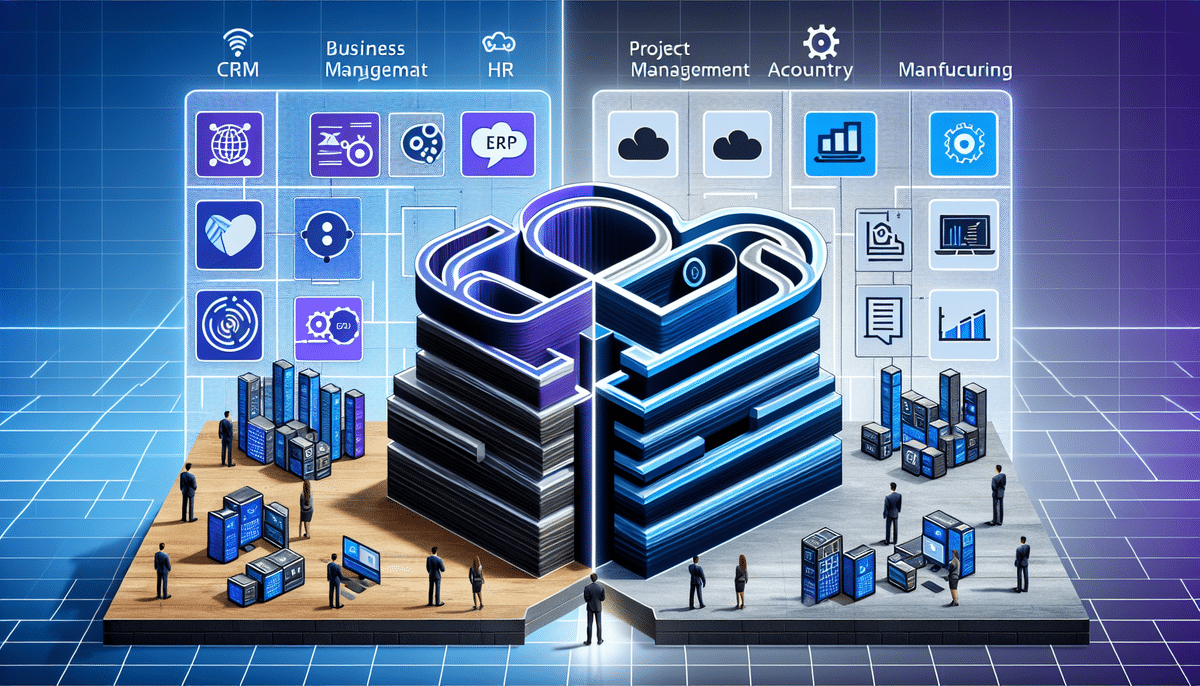Microsoft Dynamics 365 Business Central vs Odoo ERP: A Comprehensive Comparison
Selecting the right Enterprise Resource Planning (ERP) system is crucial for businesses aiming to streamline operations and drive growth. Microsoft Dynamics 365 Business Central and Odoo ERP are two prominent options in the market. This article provides an in-depth analysis of their features, pricing, integration capabilities, security, customer support, and user feedback to help you make an informed decision.
Understanding ERP Systems
ERP systems are integrated software platforms designed to manage and automate core business processes such as financials, inventory, sales, procurement, and project management. By consolidating these functions, ERP systems enhance efficiency, provide real-time data insights, and support data-driven decision-making.
Modern ERP systems are typically modular, allowing businesses to select and implement specific modules based on their unique requirements. This flexibility ensures that businesses can scale and adapt the ERP system as they grow, without unnecessary complexity or costs.
Microsoft Dynamics 365 Business Central Overview
Microsoft Dynamics 365 Business Central is a cloud-based ERP solution tailored for small to medium-sized businesses. It offers a comprehensive suite of modules covering financial management, supply chain management, sales and service, project management, and human resources.
One of the standout features of Business Central is its seamless integration with other Microsoft products like Office 365 and Power BI. This integration facilitates enhanced collaboration and advanced data analytics across various departments.
Business Central is highly customizable, allowing businesses to tailor the system to their specific needs by adding custom fields, workflows, and reports. Its scalable architecture ensures that as your business expands, the ERP system can grow alongside it without significant additional investments.
According to a [Gartner report](https://www.gartner.com/en/documents/4000456), Microsoft Dynamics 365 Business Central is recognized for its robust feature set and strong integration capabilities, making it a favored choice among businesses seeking comprehensive ERP solutions.
Odoo ERP Overview
Odoo ERP is an open-source ERP system known for its modularity and flexibility. With over 30 native applications, Odoo caters to diverse business needs, including accounting, inventory, sales, purchasing, and project management.
Odoo's user-friendly interface is designed for ease of adoption, even for those without technical expertise. This intuitive design reduces the learning curve and accelerates the implementation process, allowing businesses to realize benefits quickly.
As an open-source platform, Odoo offers significant cost advantages. There are no licensing fees for the core modules, and businesses can select and pay for only the modules they need, making it a cost-effective solution for small to medium-sized enterprises.
According to [Forrester Research](https://www.forrester.com/report/Odoo+ERP), Odoo is praised for its flexibility and the ability to customize modules to fit specific business requirements, although it may require more technical resources for extensive customizations.
Key Comparison Factors
Features and Functionalities
Both Microsoft Dynamics 365 Business Central and Odoo ERP offer a comprehensive range of features:
- Microsoft Dynamics 365 Business Central: Robust financial management, supply chain management, sales and service modules, seamless integration with Microsoft products, and advanced reporting tools.
- Odoo ERP: Extensive modular applications covering accounting, inventory, CRM, project management, e-commerce, and more, with high flexibility for customization.
For a detailed comparison of features, refer to the [ERP Comparison by Capterra](https://www.capterra.com/p/123456/Microsoft-Dynamics-365-Business-Central-vs-Odoo-ERP).
Pricing Models
Understanding the pricing structure is essential for budgeting:
- Microsoft Dynamics 365 Business Central: Subscription-based pricing model, typically charging per user on a monthly or annual basis. This model includes regular updates and support.
- Odoo ERP: Modular pricing allows businesses to pay only for the specific modules they require. The core system is open-source, reducing initial costs, with additional fees for premium modules and support services.
For current pricing details, visit the [Microsoft Dynamics 365 Business Central Pricing Page](https://dynamics.microsoft.com/en-us/business-central/pricing/) and the [Odoo Pricing Page](https://www.odoo.com/pricing).
Integration Capabilities
Integration with other software is critical for streamlined operations:
- Microsoft Dynamics 365 Business Central: Excels in integrating with Microsoft ecosystem products like Office 365, Power BI, and Azure services, enabling comprehensive data flow and collaboration.
- Odoo ERP: Offers a robust API for integrating with a wide range of third-party applications, though it may require more technical effort to achieve seamless integrations.
For integration capabilities, refer to the [Microsoft Integration Overview](https://docs.microsoft.com/en-us/dynamics365/business-central/dev-itpro/developer/devenv-integration-overview) and the [Odoo API Documentation](https://www.odoo.com/documentation/14.0/developer/api.html).
Security Features
Data security is paramount for any ERP system:
- Microsoft Dynamics 365 Business Central: Implements multi-factor authentication, role-based access controls, and adheres to various compliance standards such as GDPR and ISO 27001.
- Odoo ERP: Features customizable permission settings, ensuring that users have access only to the data and functionalities necessary for their roles.
For more information on security, consult the [Microsoft Security Documentation](https://docs.microsoft.com/en-us/security/) and [Odoo Security Guidelines](https://www.odoo.com/documentation/14.0/security.html).
Customer Support
Effective customer support can significantly impact the user experience:
- Microsoft Dynamics 365 Business Central: Offers various support options, including a comprehensive help center, community forums, and premium support services with dedicated account managers.
- Odoo ERP: Provides support through a help center, support portal, and hotline. Premium support includes dedicated account managers and priority response times.
Detailed support options are available on the [Microsoft Support Page](https://support.microsoft.com/) and the [Odoo Support Page](https://www.odoo.com/page/support).
User Reviews and Ratings
Assessing user feedback provides valuable insights into the real-world performance of these ERP systems:
- Microsoft Dynamics 365 Business Central: Holds a 4.1/5 rating on [Gartner Peer Insights](https://www.gartner.com/reviews/market/erp-system/vendor/microsoft/product/dynamics-365-business-central), with users commending its extensive features and seamless integration with other Microsoft products. Some users note challenges with customization and reporting complexities.
- Odoo ERP: Receives a 4.3/5 rating on [TrustRadius](https://www.trustradius.com/products/odoo/reviews), with praise for its flexibility and user-friendly interface. However, users sometimes report issues with support responsiveness and occasional software bugs.
Case Study Comparisons
Examining real-world implementations provides practical insights:
- Weir Oil and Gas: A global engineering firm that adopted Microsoft Dynamics 365 Business Central to leverage its integration with Microsoft tools and comprehensive feature set, enhancing operational efficiency.
- ColArt: An art materials company that chose Odoo ERP for its flexibility and modular approach, allowing the company to tailor the system to their specific business processes and scale as needed.
For detailed case studies, visit the [Microsoft Customer Stories](https://customers.microsoft.com/en-us/story/search) and the [Odoo Success Stories](https://www.odoo.com/page/customers).
Choosing the Right ERP System for Your Business
When selecting between Microsoft Dynamics 365 Business Central and Odoo ERP, consider the following factors:
- Business Size and Growth: Business Central is well-suited for small to medium-sized businesses with plans for significant growth, while Odoo offers flexibility for businesses looking for customizable solutions.
- Budget Constraints: Odoo's modular pricing can be more cost-effective, especially for businesses with limited budgets, whereas Business Central's subscription model includes comprehensive support and regular updates.
- Integration Needs: If your business heavily utilizes Microsoft products, Business Central provides seamless integration. Odoo offers broader integration capabilities with various third-party applications through its robust API.
- Technical Expertise: Business Central may require less technical management if you're embedded in the Microsoft ecosystem, whereas Odoo might necessitate more technical resources for customization and integration.
Ultimately, the best ERP system aligns with your business’s specific needs, growth plans, and operational priorities. Evaluate each system's strengths and weaknesses in the context of your organization to make the most informed decision.




















